Lawnmower Buying Guide – Picking The Best Option For Your Lawn
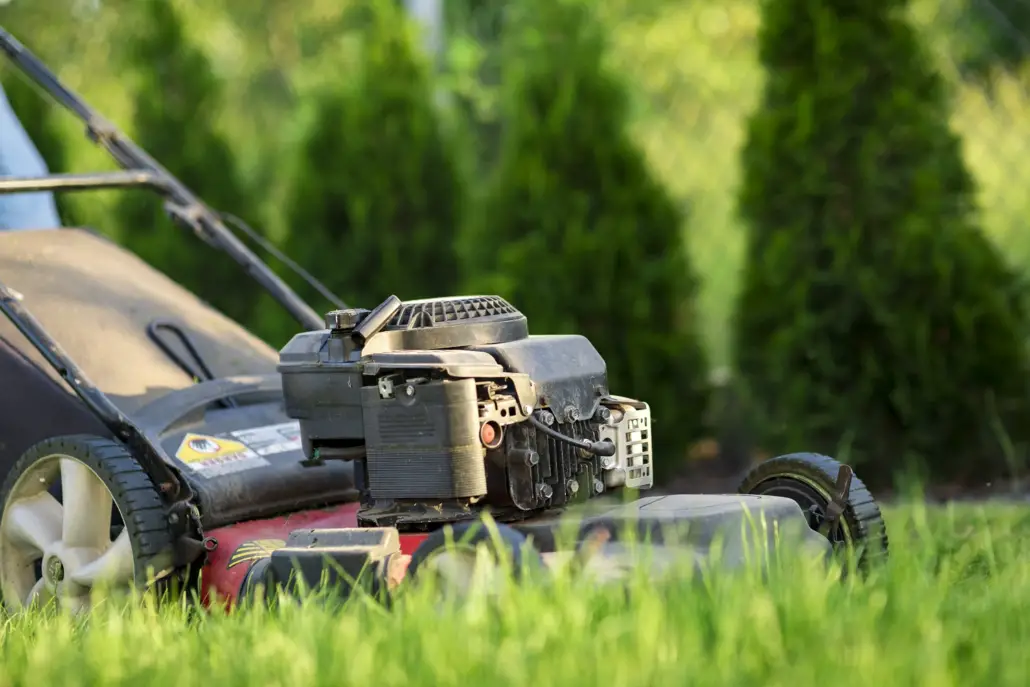
These days, people are trying to save money wherever they can. One way to trim expenses is by trimming your own lawn.
Tending to your own lawn gives you the satisfaction of turning your outdoor spaces into beautiful oases and it also gives you the satisfaction of getting out in the sunshine and getting some good exercise.
But have you ever tried to push and old rusted lawnmower or get a gas-powered mower running when it is in disrepair? If so then you know that a satisfying day in the sun can quickly become a dreadful experience with the wrong kind of equipment.
If you are new to mowing your own lawn, you probably have a lot of questions about your current lawnmower or ones that you are thinking of buying. If you already have some experience, you still might have some important questions.
So today we wanted to create a comprehensive guide to lawnmowers and how to pick them. There are a lot of factors that go into choosing the right mower for your lawn but rest assured, we are here to cover all of them.
To put things simply, you need to consider the size of your lawn. You also need to consider what is growing in your lawn and garden. Finally and perhaps more importantly, you will need to think about your lawnmower budget.
That is putting things tersely but there are certainly more details to cover so let’s get into your lawnmower buying guide!
Things to Consider When Buying A Lawnmower
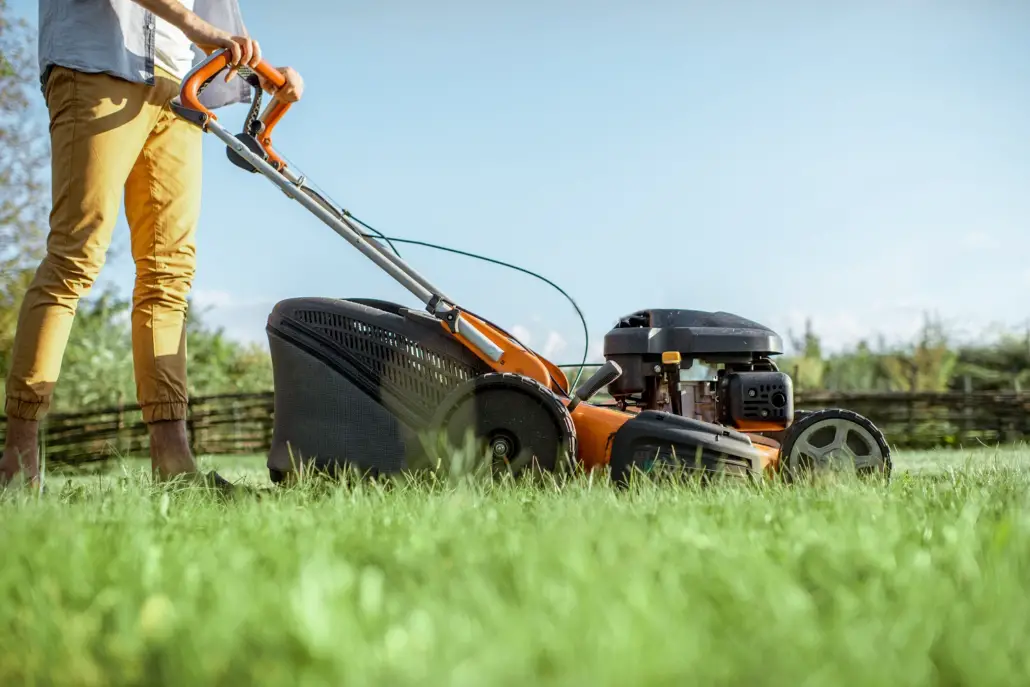
Remember that a lawnmower is an appliance that should make mowing your lawn easy and most importantly, enjoyable. A lot of people derive a lot of satisfaction from maintaining their own lawns and you could certainly be one of them.
But when you buy the wrong lawnmower for your needs, you could be wasting money when the original intention was to save money. Even worse, you could be put off the hobby altogether. That is why you should carefully consider the following:
- Size of the Garden – The size of your garden/lawn will dictate how large a mower you will need and how much power it will need. In general, if you have a lawn of 330 square feet, electric and cordless mowers should work fine. For medium lawns up to 820 square feet electric, cordless and gas-powered mowers should be considered. For larger lawns over 820 square feet , you should probably only considering gas-powered or a riding mower.
- Width and Length – The width and length of your mower will determine how fast it can cut grass. Mowers with 22 inch wide decks are usually fine for small to medium sized lawns. For larger lawns, you may want to look at specialized 28-33 inch wide mowers from brands like Toro.
- Personal Preferences – You may not be able to physically push around a cylinder mower or want to carry a cordless mower. So you will have to determine what kind of mower fits your personal preferences and your physical capabilities.
- Garden Demands – For lawns with a lot of complex features, you may want to look at mowers with front casters that make it easier to pivot at sharp angles.
- Mulching – Do you want a mower that can turn grass clippings into mulch for your garden? There are options for that as well.
- Budget – Last but not least, your budget needs to be carefully considered. Remember that these devices can range from one-hundred to several thousand dollars.
Different Types of Lawnmowers
We have just scratched the surface and alluded to a few different types of lawnmowers thus far. Now it’s time to get into the details of the different kinds of lawnmowers at your disposal. The main types include:
- Cylindrical
- Gas Powered
- Electric
- Robot
- Ride On Lawn Mowers
But what does each category mean? To find the best lawnmower for your needs, you will need to know the pros and cons of each one so let’s take a look at each type individually.
Cylindrical Lawnmowers
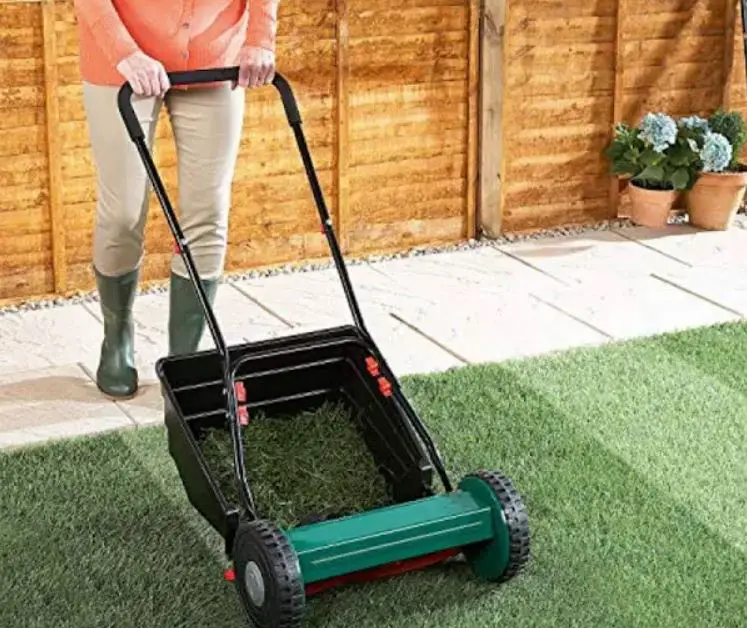
Cylinder lawnmowers are very simple and consist of a fixed blade at the bottom of a rotating cylinder that also contains blades. As the mower is pushed, the bladed cylinder rotates and snips grass against the fixed lower blade.
Pros:
- Inexpensive – Cylinder lawn mowers tend to be the most inexpensive. In fact, you can get a manual push cylinder mower for well under $100.
- Good for Flat Lawns – These types of mowers work really well if your lawn and/or garden doesn’t have a lot of pitches or inclines.
- Sharp Cutting – Cylinder mowers work like scissors and provides a sharp cut that doesn’t traumatize the grass. This means fewer brown tips and less water loss.
Cons:
- Susceptible to Damage – Stones and other objects can easily damage these kinds of lawnmowers if you aren’t very careful.
- Limited Flexibility – These types of mowers work best when the grass has grown tall and is ripe for mowing which may not fit into your schedule.
Cylinder lawnmowers would be best for people with smaller, mostly flat lawns and limited storage space. Also, be aware that there are electric, gas-powered and manual push versions of cylinder lawnmowers.
Gas Powered Walk Behind Mowers
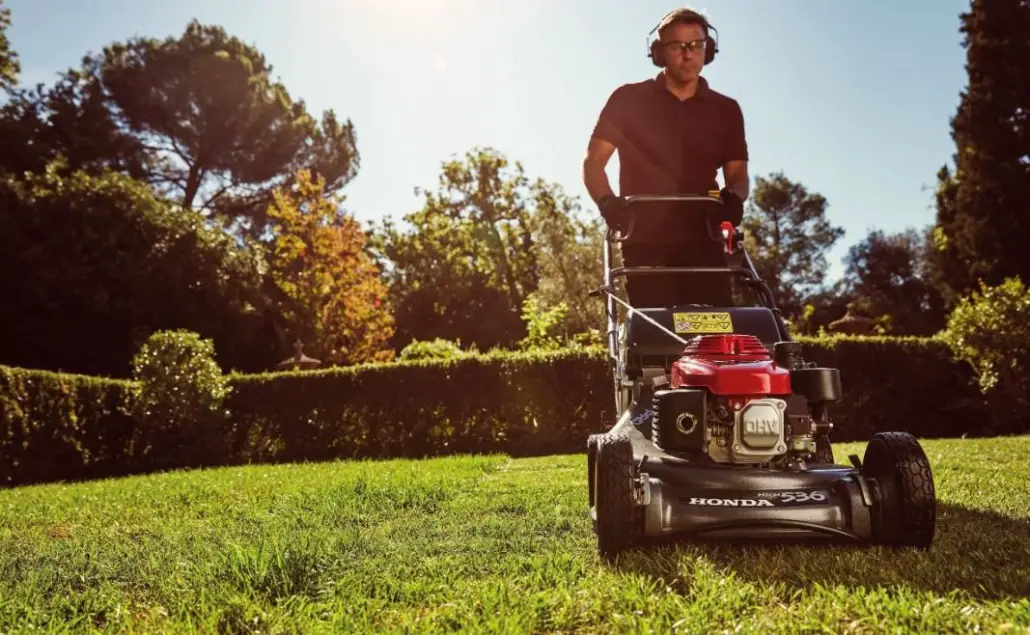
Gas powered walk behind mowers are more powerful than manual cylinder motors and can come with a wide variety of features.
When selecting a gas-powered mower, it would be best to consult with a salesperson to have them walk you through all the features.
Pros:
- Affordable Replacement Parts – Should your gas-powered motor need replacement parts, they will generally be more affordable than electric mower replacement parts.
- Cordless Operation – You will not need to manage power cords or keep up with batteries with a gas-powered walk behind mower.
- Good for Large Lawns – Gas-powered mowers offer more power, cut quicker and are more practical for larger lawns than some other options.
Cons:
- More Expensive – A gas-powered motor will have a higher upfront price than a manual cylinder mower.
- Maintenance – You can think of a gas-powered motor much like a car: it will need periodic oil changes and other minor maintenance.
Gas-powered walk behind mowers are a good choice for anyone that has a large lawn or one that does not have easy access to electrical outlets. These types of mowers come in a wide variety of styles including push versions and self-propelled versions.
There are a lot of other features that include side discharge where the clippings are jettisoned off to the side or bag feed where the clipping are caught in a bag. You should also consider the wheels. Ball-bearing wheels are ideal if you choose a gas-powered push mower.
You may also want to consider a mower with rear wheels larger than the front wheels. This will make it easier to navigate through rough terrain.
Electric Powered Walk Behind Mowers
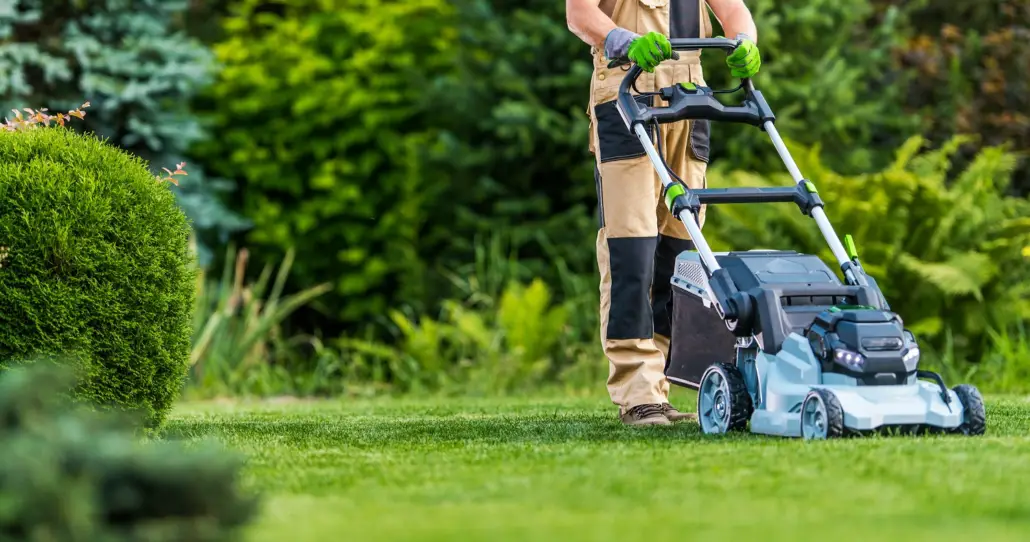
Electric walk behind mowers can run off of a power cord or a battery. Though not as high-powered as most gas-powered motors, they are a good option of you have a small lawn or garden.
Pros:
- No Gas Required – You don’t have to make sure that your electric mower has enough gas to complete the job.
- They Run Quiet – Electric-powered walk behind mowers run much quieter than gas-powered motors.
- They’re Safer – You don’t need to keep reserves of gas handy with these kinds of mowers. You also don’t have to worry about spilling gas.
Cons:
- Outlet Dependent – Some models need to be plugged into an electrical outlet at all times which may become an inconvenience.
- Torque Rating – Typically, electric-powered mowers will not have as much torque as a gas-powered mower.
These types of mowers would be best for people with small lawns. Remember that you can choose either corded or cordless electric mowers. Cordless mowers give you more freedom and mobility but you will need to keep up with charging the battery.
Corded mowers are ready to go but may not be viable for homes with no easy outdoor electrical outlet access. Electric mowers also come in push and self-propelled versions. Wheel size will vary but the same principles apply as with gas-powered mowers.
Hover Lawnmowers
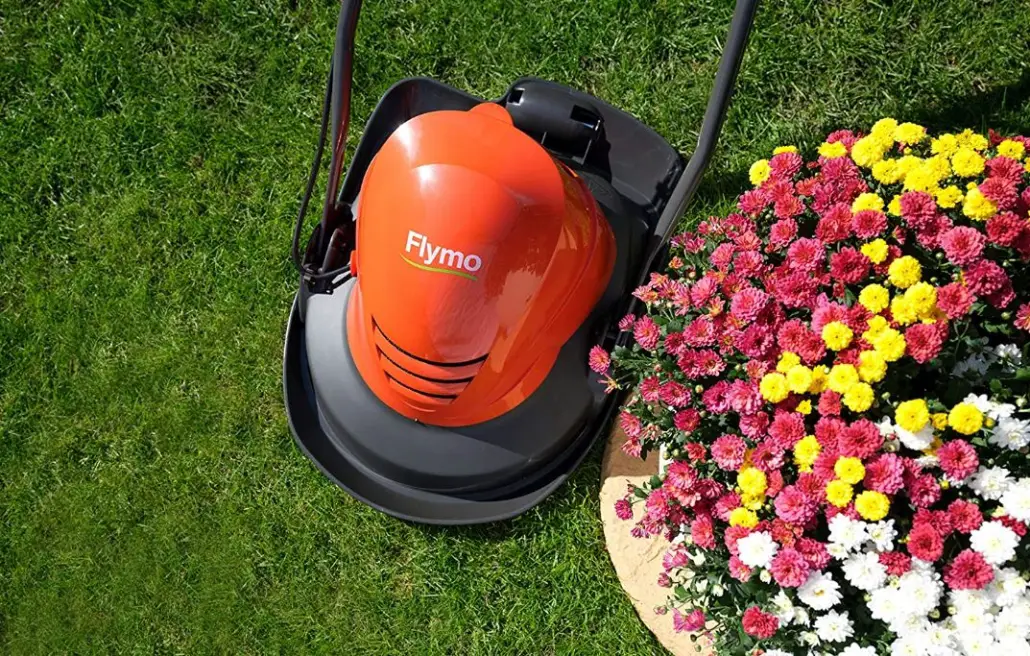
A hover mower is one that uses air pressure propulsion to essentially lift the lawnmower above the surface of the lawn.
The mower essentially floats over the grass and cuts it with blades. These types of mowers can be moved in any direction.
Pros:
- Easy to Push – Because there are no wheels or contact with the ground, hover motors are very easy to push.
- More Movement – Hover mowers can also be moved in any direction at any time.
- Great on Inclines – You may want to consider a hover mower if your lawn has a lot of pitches and inclines.
Cons:
- No Stripes – Because of the circle shape of most hover mowers, they don’t produce the mowed stripes that most people like.
- Heavy – When they aren’t in use, hover mowers can be very heavy which may make storage difficult.
Hover mowers are great for lawns with a lot of hills and pitches or a lot of trees and flower beds that need to be navigated around. Most hover motors come with a rotary blade cutting system and naturally, will not have wheels.
Robotic Mowers
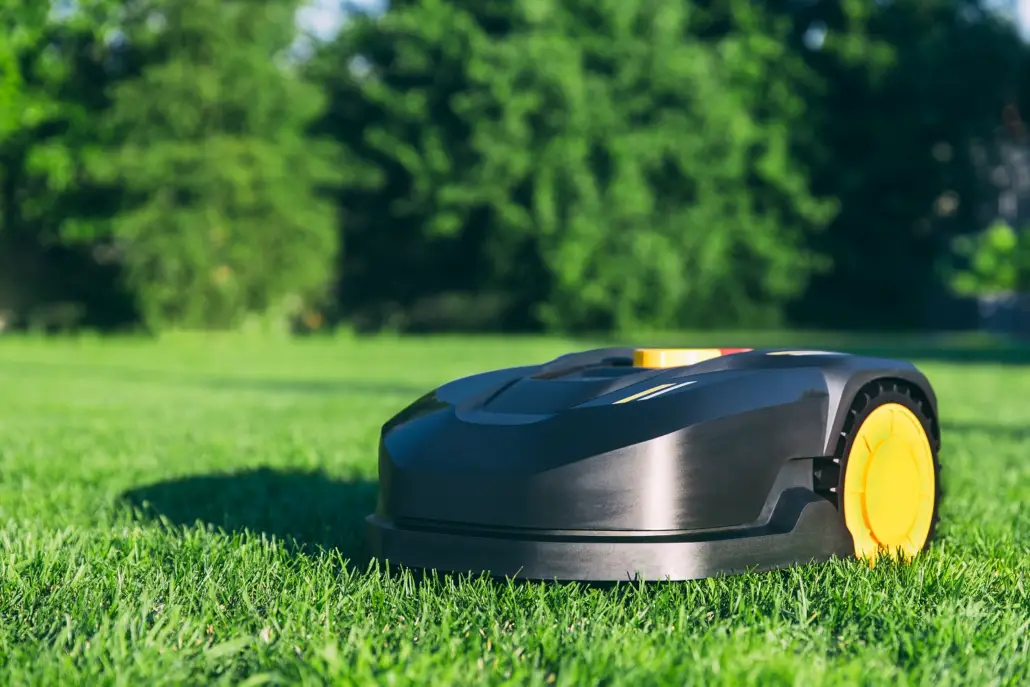
Robot lawnmowers work very much like Roombas and other robotic vacuum machines. They may work with a perimeter wire that needs to be placed manually but can run on their own and dodge obstacles.
Pros:
- Low-Maintenance – Robotic lawnmowers essentially do all the work for you so they can make lawn maintenance very simple.
- Self-Charging – Some models can park themselves in a charging station when their battery gets low.
- Safe Operation – You don’t have to worry about being near blades or have to deal with refilling gas with this kind of mower.
Cons:
- They Can be Pricey – Modern robotic mowers with advanced features can be very expensive.
- The Technology isn’t Perfect – It is more likely that robotic mowers will leave patches or fail to edge your lawn properly.
Robotic mowers are certainly more for people who don’t really want to deal with mowing their lawns. These mowers may use razor blades on a rotary disc or a single rotating blade. You can also get them in various widths and cutting heights.
Ride On Lawnmowers
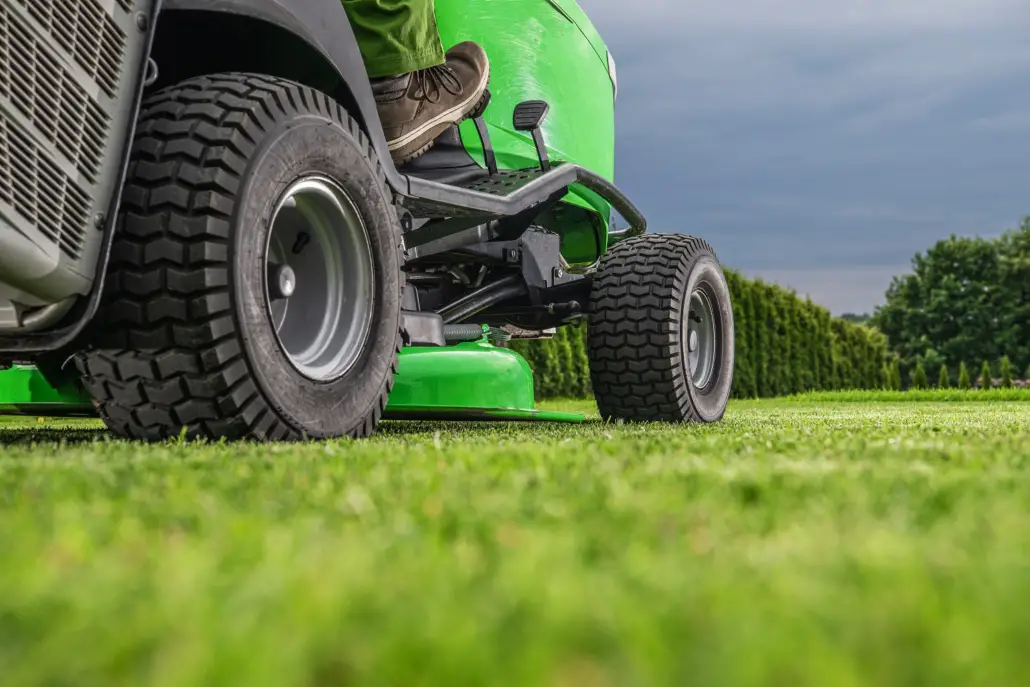
Instead of walking behind the mower, a ride mower allows you to sit on top while the blades in the deck underneath chop the grass. They are operated with various motors, a steering wheel and usually, 4 wheels.
Pros:
- Easier on the Body – Ride mowers may be a better choice for senior citizens as it is much easier on the body than a push mower.
- Great for Large Lawns – Ride motors are great for commercial use or if you have a particularly large lawn.
- They’re Fun – Mowing the lawn with a ride mower is a lot like taking a slow cruise in a car or go-kart.
Cons:
- They’re Expensive – Naturally, a ride mower will be more expensive than most other kinds due to the power capacity and complex design.
- Maintenance – There are a lot of working components in these kinds of mowers which can make for very demanding maintenance.
These types of mowers are for people with large lawns or for commercial use. They come in a wide variety of styles and there are a ton of additional features available. You can get attachments that allow you to spread seed, bag clippings and haul landscaping equipment. Some models can even aerate the soil and remove snow.
Overview of Zero-Turn Lawnmowers

Zero-turn mowers essentially allow you to turn and pivot in place without having to move forward. They are powered by twin hydraulic transmissions that control the rear wheels.
This allows the wheels to operate at independent speeds which allows for the zero turn radius. These types of mowers are ideal for commercial use or for lawns that have a lot of features and tight angles.
What’s A Brushless Lawnmower?
A brushless lawnmower is one that runs off of electricity. These are usually push mowers that run off of a battery. They do not use brushes in the motor to provide electricity and power.
Gas Vs. Electric Mowers
The main advantage that gas-powered mowers have over electric is that they are more powerful. That is why they are more beneficial if you have a larger lawn or your mowing needs are more demanding.
On the other hand, electric mowers are eco-friendly as they don’t rely on gas to operate. Many of them are powered with rechargeable batteries. However, you will want to avoid corded electric mowers if you can as the cord can really get in the way of your mowing.
Electric mowers also run quieter and require less maintenance than gas-powered motors as gas-powered motors employ what is essentially a small car engine.
Walk-Behind Vs. Ride-On
This argument boils down to the size of your lawn. If you have anything more than a quarter acre to mow, then you will probably want a riding mower. For smaller lawns, walk-behind mowers offer a bit more versatility.
You can also typically do more detailed work with a walk-behind mower. You can get walk-behind mowers with front-wheel drive which is good for flat lawns, rear-wheel drive which is good if you have to push the mower uphill a lot and even all-wheel drive mowers.
Ride-on mowers will also be advantageous for people with joint, bone or muscle conditions as they are much less taxing on the body.
Self-Propelled Vs. Manual
Manual mowers will generally require less fuel and maintenance. They are lighter and typically more affordable. Plus, manual mowers allow you to get a bit of exercise when mowing your lawn.
Self-propelled mowers take a lot of the physical labor out of mowing your lawn. They may be a good choice if you have much more to do in your lawn/garden than simply mowing.
Front Vs. Rear Self-Propelled Mowers
Rear-wheel drive mowers will make it easier to push up steep hills and inclines while front-wheel drive mowers make pushing through flat terrain nearly effortless.
Different Size Gardens
Different sized gardens will require different specifications from your lawnmower – namely cutting width. Here is a basic guide:
- Small Lawns – With smaller lawns, you can get away with a mower with a cutting width of about 11 inches.
- Medium Lawns – For medium lawns, you will want a mower with a cutting width of at least 15 inches.
- Large Lawns – Anything over 15 inches will be ideal for larger lawns.
Frequently Asked Questions
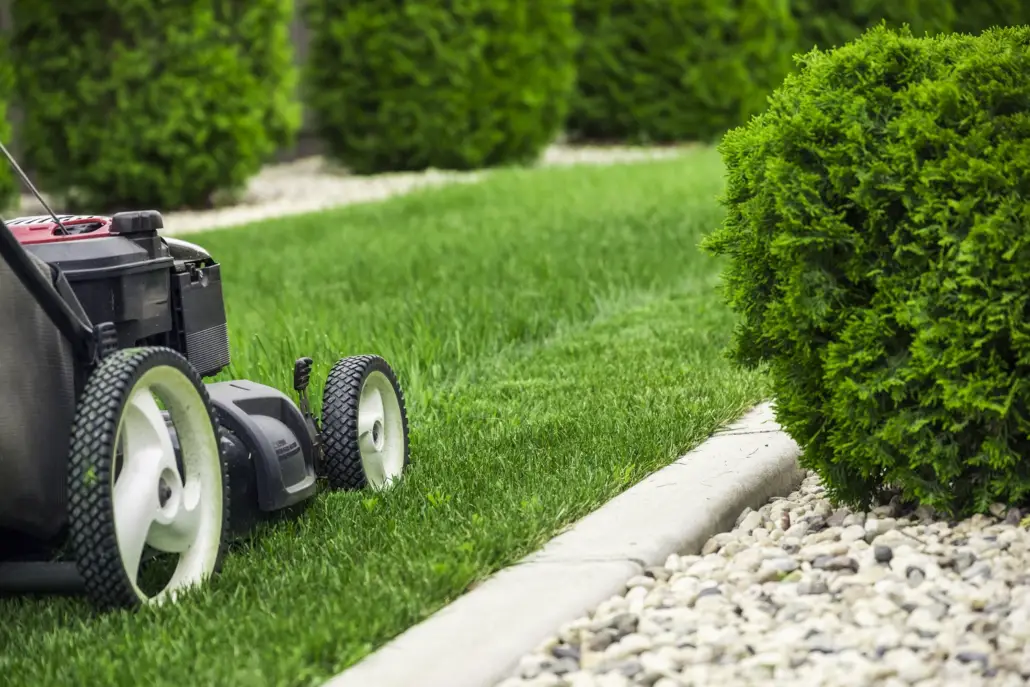
Q: How Important Are The Wheels In A Lawnmower?
The wheel size will determine how easily the mower goes uphill and how much strain is put on the mower operator. Larger wheels are better for uphill lawns and rough terrain.
Q: Benefits Of Larger Rear Wheels?
Larger rear wheels will make it easier to pivot the mower and to push it up inclines.
Q: What’s The Easiest Lawnmower To Start?
Electric-power lawnmowers tend to be the easiest to start.
Q: Why does my mower cut better when I pull it backwards?
This may be a sign that your blades need to be sharpened. With most push motors, only one side of the blade is used when pushed forward. When pulled in reverse, the opposite side is used which may be sharper than the frequently used front side.
Q: Are mulching blades with teeth better?
Not if they don’t have an extended cutting edge.
Q: Can you push self propelled lawn mower?
Yes you can push a self-propelled mower without harming the transmission but it will probably still be heavy.
Q: How Often Do You Need To Change The Oil?
The general rule of thumb for lawnmowers is every 50 operating hours.
Q: How Long Do Battery Powered Lawnmowers Last?
You can expect battery-powered mowers to last between 8-10 years with proper maintenance.
Q: What About Wet Grass?
It is not ideal to mow wet grass as it can damage the soil and wet grass is generally harder to cut.
Q: Which Type Of Lawnmower Is Most Dangerous?
Mowers with rotary blades can be dangerous because they can whip stones and other objects at the operator or bystanders at fast speeds.
Q: How Often Do I Need To Replace The Lawnmower Blade?
Most homeowners will need to change their mower blades once a year.
Q: Should You Clean Your Mower After Every Use?
It’s easiest to remove clipping from your mower as soon as your done mowing so yes, the ideal frequency for cleaning is after every use.
Q: What Do With Really Long Grass?
You may need to take a pass at long grass with a gas-powered string trimmer before mowing to get it under control and mow more effectively.
Q: Top 3 Lawnmower Safety Tips
Clear debris from your lawn as much as possible including large sticks and stones. Wear long pants and closed-toe shoes and protect your ears with ear plugs or over-ear covers.
Q: What Are The Best Lawnmower Brands In USA?
It may be a matter of opinion but consumers and professionals typically point to John Deere, Toro and Troy-Bilt as the best lawnmower brands.
Q: How Much Power Do You Need?
That will depend on the type of grass you have and the size of your garden.
Final Thoughts
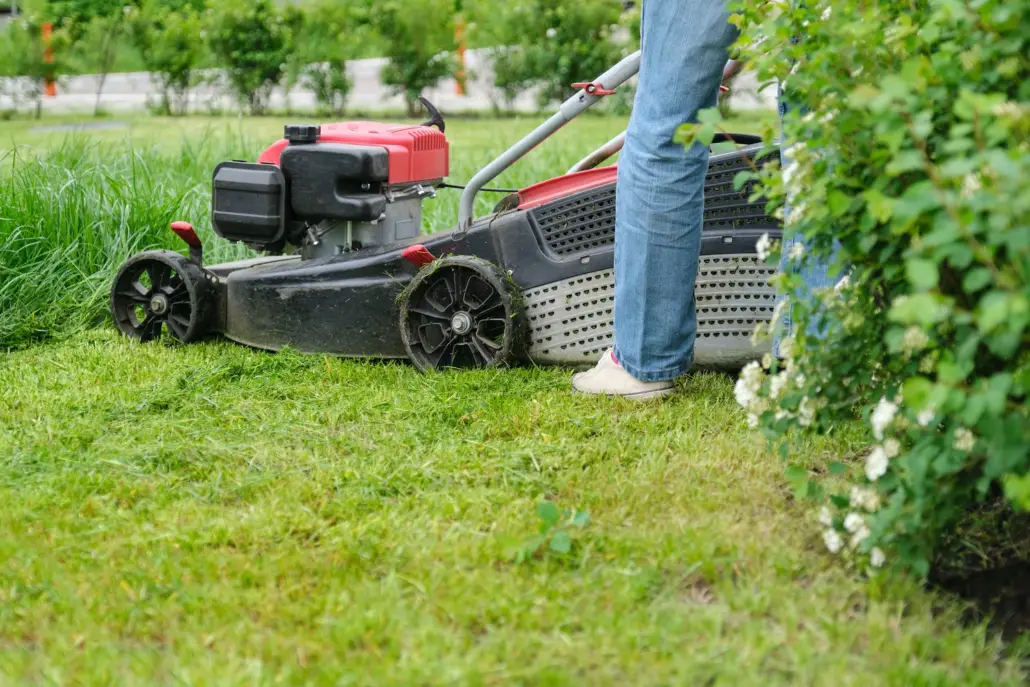
The right lawnmower can help you save money and give you a new hobby to enjoy. Even working on and maintaining your mower can be an enjoyable experience if you like to work with your hands. But there are a lot of options to consider.
We hope our guide has given you a clearer picture of the type of mower you want/need for your lawn. Be sure to check out all of these types before making a decision!


